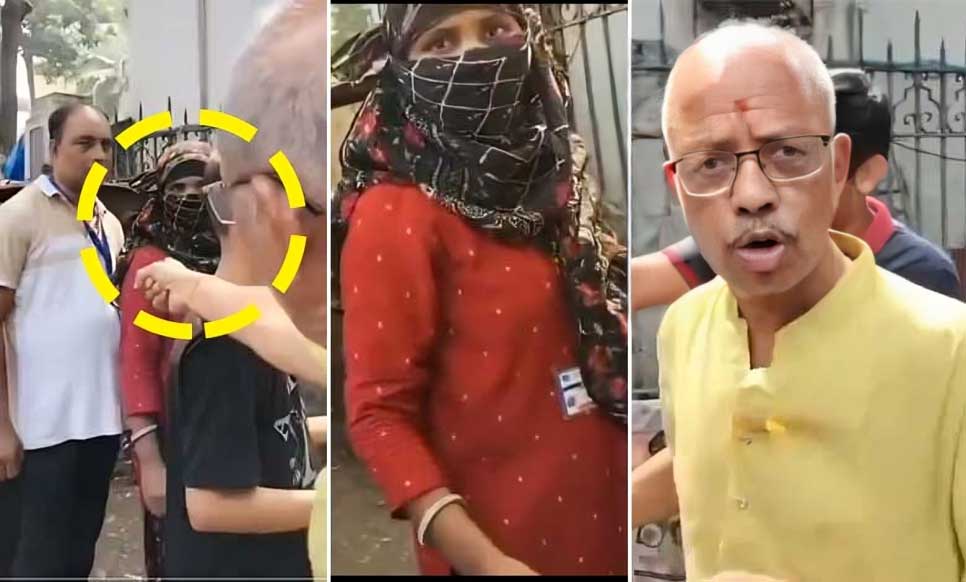Viral Video: Is Refusing to serve Food for Not Chanting Jai Shri Ram Legal? Know Your Constitutional Rights.
Viral video of an elderly man distributing food outside Mumbai’s Tata Hospital, refusing food to a woman for not chanting 'Jai Shri Ram,' raises questions: Is refusing to serve food for not chanting Jai Shri Ram legal under Indian law?

In a scenario outside Tata Hospital, an elderly man is seen distributing food but requires individuals to chant “Jai Shri Ram” before receiving it. This raises critical legal questions: Is Refusing to serve Food for Not Chanting Jai Shri Ram Legal? Under Indian law, this action touches on issues of coercion and individual rights, highlighting the constitutional protections against forced religious expressions.
Key Moments in the Viral Video:
- Uncle – “Everyone will chant Jai Shri Ram & receive food.”
- Muslim Woman – “How dare you? Why will I say? I won’t chant Jai Shri Ram; I still want Langar.”
- Uncle – “Fine, I won’t give you food.”
- Locals – “If you don’t want to chant Jai Shri Ram, don’t take food.”
- Woman – “Why will I say Jai Shri Ram?”
Uncle’s refusal to provide food without the chant, despite the woman’s persistence, has ignited a debate on the legal and ethical boundaries of religious freedom and service in public spaces.
Is Refusing to serve Food for Not Chanting Jai Shri Ram Legal?
Constitutional Rights Involved
- Right to Freedom of Religion: Article 25 of the Indian Constitution protects the right to freely profess, practice, and propagate religion. While specific links for Article 25 were not provided in the search results, you can find detailed information about this article on legal and constitutional websites such as Legal Service India.
- Right to Equality: Article 14 ensures equality before the law and prohibits discrimination based on religion. For a comprehensive overview of Article 14 and its implications, you can refer to:
- Right to Freedom of Speech and Expression: Article 19(1)(a) protects an individual’s freedom of speech, including the right not to express beliefs against one’s will. While specific links for Article 19 were not included in the search results, you can find detailed discussions on this article at resources like Legal Service India or similar legal educational platforms.
Legal Analysis of Forced Chanting for Receiving Food
- Coercive Condition: The old man’s requirement for individuals to chant “Jai Shri Ram” before receiving food can be viewed as a coercive condition. If someone, like the masked woman, refuses to chant and is subsequently denied food, this could be interpreted as a violation of her constitutional rights.
- Legal Precedents: While there may not be specific Supreme Court rulings directly addressing this exact scenario, the principles established in various cases emphasize that individuals cannot be compelled to participate in religious practices. Courts have consistently upheld that such coercion infringes upon personal liberties and constitutional protections.
Is Refusing to serve Food for Not Chanting Jai Shri Ram Legal? In this case, requiring someone to chant “Jai Shri Ram” to receive food likely violates Indian law, as it constitutes coercion and infringes on constitutional rights to freedom of religion and equality. If the woman refuses to chant and is denied food, this could lead to legal challenges against the elderly man for infringing on her rights.
Is Refusing to serve Food for Not Chanting Jai Shri Ram Legal?
Refusing to serve food based on the requirement to chant Jai Shri Ram raises significant legal concerns regarding discrimination and freedom of expression. The Constitution protects individuals from being forced to express religious or political sentiments, suggesting that such refusal may not be legally justified.
What are the constitutional rights related to freedom of expression in this context?
The First Amendment of the U.S. Constitution guarantees the right to free speech, which includes the freedom to refrain from speaking or expressing particular beliefs. Thus, individuals cannot be compelled to chant Jai Shri Ram in exchange for services, reinforcing the defense against unlawful discrimination in public settings.
How can individuals protect their rights if they face discrimination for not chanting Jai Shri Ram?
Individuals can protect their rights by documenting the incident, gathering evidence, and seeking legal advice. They may also file complaints with civil rights organizations or local authorities to address potential violations of their constitutional rights related to freedom of expression and discrimination.
You May Also Like to Read Other Articles on Legal Rights and Religious Freedom:
- Telangana High Court Issues Notices Over Legality of “Mission Chabutra” and “Operation Romeo”: This article discusses a Public Interest Litigation challenging police operations that allegedly infringe upon Articles 14 (right to equality) and 21 (right to life and personal liberty) of the Indian Constitution. Read more here.
- Right to Freedom of Religion Doesn’t Include a Fundamental Right to Convert: This article addresses the Supreme Court’s stance on the right to freedom of religion, clarifying that it does not encompass the right to forced conversion. Read more here.
- ‘Dharma Sansad’ Hate Speech Case: Army Veterans Move SC Seeking SIT Probe: This piece covers a legal action taken by Army veterans regarding hate speech, highlighting issues related to constitutional rights and legal accountability. Read more here.
